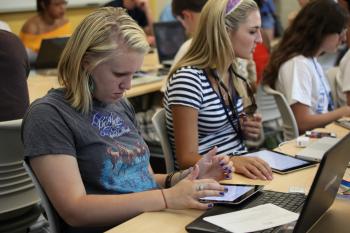Thank you to Alice Keeler, Starr Sackstein, Justin Tarte, Annie Murphy Paul, and Daisy Dyer Duerr. I used to think that these were Super-Hero People who had some special gift or ability in the area of education. But I've come to understand that they are just regular people like you and me who are eager to share their thoughts and ideas with the rest of us. I, for one, am extremely grateful to include them among my professional learning community. (And so are tens of thousands of other educators who follow these folks!) I am continually inspired by your words; you keep me going and keep me writing. Thank you.
------------------------------------------------------------------------------------
Here are my top five posts from 2015:
#5) Open Letter to Teachers
 This was the second (and most popular) of a three-part series of Open Letters to the three most important stakeholders in our educational system: Students, Teachers, and Parents. I wrote this "letter" to teachers on the eve of the 2015 - 2016 school year. It was published on August 19th. In it, I talked about how excited teachers are when a new school year begins--something, I bet, a lot of students don't realize. I wrote about the tough job of teaching and I applauded the men and women who accept this responsibility. Sometimes being a teacher involves difficult conversations with students about the need to continually struggle to learn something that isn't easy at first. Teachers shape the minds that shape the future of our country. Teachers' influence over student achievement is well documented. We always need great teachers.
This was the second (and most popular) of a three-part series of Open Letters to the three most important stakeholders in our educational system: Students, Teachers, and Parents. I wrote this "letter" to teachers on the eve of the 2015 - 2016 school year. It was published on August 19th. In it, I talked about how excited teachers are when a new school year begins--something, I bet, a lot of students don't realize. I wrote about the tough job of teaching and I applauded the men and women who accept this responsibility. Sometimes being a teacher involves difficult conversations with students about the need to continually struggle to learn something that isn't easy at first. Teachers shape the minds that shape the future of our country. Teachers' influence over student achievement is well documented. We always need great teachers.#4) Learning vs. The Appearance of Learning
Published on March 28th, this is an issue in which I feel very deeply. The issue of the best way to measure learning and the problem (at times) of students appearing to be learning well (i.e. - getting good grades) but its only an appearance and it isn't real learning.
I feel that P-12 education is the time when we have to be honest with students and their parents. We don't want students to believe that they are achieving at a high level only to learn later in life (perhaps while sitting in a college class) that the grades they earned in high school did not represent their true ability. The job of schools is to help students to learn. We need to use multiple measures to get a true picture of their level of learning. "Getting-a-good-grade" is not the job of schools.
#3) We Should Value Good Thinking More Than We Value Good Memorizing
This post, from May 29th, quotes from Dr. Jo Boaler and Cathy Seeley. In it, I talk about how our students' thinking should be rewarded more than their ability to memorize math facts. Sometimes elementary children who are very good at memorizing their multiplication facts (and recited them quickly) are viewed as being more able than students who cannot do this. But we really don't students who can merely memorize facts. What we really want is students who can think and reason and build on known facts to gain further knowledge. Sometimes students memorize facts without knowing why the facts are true. Later in their P-12 education they struggle because of this lack of understanding. The goal isn't speed; the goal is learning.
#2) No More Worksheets
I began this post (from April 3rd) with a simple question:
Does you your child's mathematics teacher assign a lot of worksheets for homework and classwork?
If the answer is YES - Not a very effective teacher.
If the answer is NO - Likely to be a more effective teachers.
Of course, this is an exaggeration, but the point is that this staple of P-12 education (the worksheet) should be a thing of the past. They are boring; they are very un-engaging; and they de-emphasize thinking over mere "following steps". They represent the opposite of what we want to see in our classrooms today. Students should be spending class time reasoning and thinking and debating; they should be sharing ideas and thoughts. They should hear from other students. By the response I got from my readers, I'm thinking that this idea is not as radical as it may sound to some.
#1) Growth Mindset Teachers
This post had the most views of any post I've written since I started blogging more than two years ago (142 posts). I talked about the idea of Growth Mindsets as created by Carol Dweck. Specifically I talked about teachers who have the mindset that says anyone can learn. These teachers help their students to understand that learning is always possible; productive struggle is a good thing; and their past negative learning experiences does not predict their future learning.
Thank you to everyone who have shared this journey of learning and thinking with me in 2015. The best of us are always trying to improve and to learn more. Continue on and find your way to be the best educator you can be.
All the best!
Peter Cincotta




.jpg)


